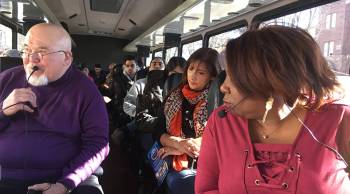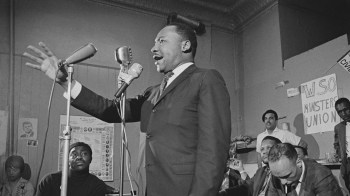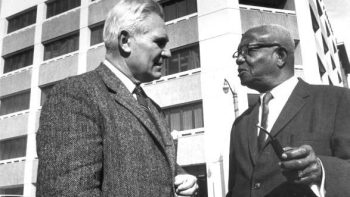MLK’s old neighborhood seeks economic comeback
Nearly 50 years ago, Martin Luther King, Jr., told the world of his dream of equality — where character mattered over color. An estimated one million visitors now make their way to the King Center in Atlanta each year, where they’re reminded of King’s importance in the struggle for civil rights. But often, they take away another memory — one of a decaying, urban wasteland surrounding the area where King was born.
The “Sweet Auburn” neighborhood, as it’s known, continues a decades-long struggle for survival. In the middle of it is Sonya Jones, owner of the Sweet Auburn Bread Company.
“You can call me ‘Chef Sonya,’” Jones says, talking over the hum of industrial-sized ovens and Hobart stand-mixers.
Jones started her business 15 years ago. “And I named the bakery for this district,” she says.
As a kid, Jones remembers coming to Auburn Avenue in its heyday — the “good” days when the Sweet Auburn district was a thriving hub of African-American business and culture. In 1956, Fortune Magazine dubbed Auburn Avenue the “richest Negro street in the world.” Martin Luther King, Jr., grew up on Auburn Avenue. Ebenezer Baptist, where he preached, is here too.
That connection to the African-American community is why Jones wants to remain on Auburn Avenue. As she folds in the ingredients for her favorite recipe, oatmeal raisin cookies, she shares stories. Like the time she fed President Clinton. Or when she appeared on the Food Network. She’s eager to talk about the cookbook she authored.
And how she struggles: “I climb one hill, and there’s another one.”
Sweet Auburn Bread Company keeps afloat mostly through phone and Internet orders. Jones says customers rarely walk through the door. Some are afraid of the neighborhood, she says. At some point, Sweet Auburn changed.
“As with many African-American communities across the country, an interstate highway bisected it,” says Georgia State University history professor Cliff Kuhn.
The highway, known locally as the Downtown Connector, slices through the heart of Auburn Avenue. Kuhn says the highway’s construction in the 1950s and ’60s was arguably the neighborhood’s biggest blow — but not its only one.
“The second is actually desegregation itself,” says Kuhn. “Auburn Avenue provided places of employment well after the Civil Rights Act. With the Civil Rights Movement, African-Americans could find employment elsewhere.”
Decades since of crime, poverty and abandonment allowed for the corridor’s further decay. But that could be changing.
“Four thousand students right now live in this area,” says Mark Becker, president of Georgia State University.
Once a commuter campus, the school is becoming more residential. Georgia State recently opened a dorm for 2,000 students on Auburn Avenue, bringing new life to the northern part of Sweet Auburn.
Becker says renewed local and national attention to the neighborhood is slowly bringing new opportunities to the historic area. “We believe they’ll succeed, and we believe that we’re an important part of that.”
Atlanta City Councilman Kwanza Hall, whose district includes Sweet Auburn, praises Georgia State’s efforts as a “catalyst.” But fixing the neighborhood where Martin Luther King, Jr., was born, preached and is now buried, will take a global effort.
“This is an all-call to help us make the Sweet Auburn corridor — the Martin Luther King Historic District — be reflective of the legacy that Dr. King spoke of,” says Hall.
Work is now underway on a streetcar that will link the King Historic District to Atlanta’s downtown tourist center.
Many think it could be the tipping point in making Sweet Auburn sweet once again.
There’s a lot happening in the world. Through it all, Marketplace is here for you.
You rely on Marketplace to break down the world’s events and tell you how it affects you in a fact-based, approachable way. We rely on your financial support to keep making that possible.
Your donation today powers the independent journalism that you rely on. For just $5/month, you can help sustain Marketplace so we can keep reporting on the things that matter to you.


















